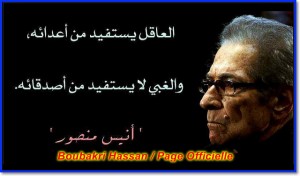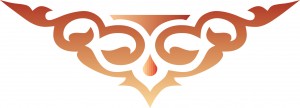Reading Comprehension Answers: “Politicians” by Anis Mansour Posted by Fisal on Sep 7, 2014 in Arabic Language, Culture, Grammar, Vocabulary
Ahlan Arabic fans! How was the reading exercise? Here, I present the answers to the Reading Comprehension Exercise; “Politicians” by Anis Mansour; the famous Egyptian writer and philosopher. The passage was part of his daily column in Al-Ahram newspaper. To view the exercise again, click here.
الإجـــَــــابـــَــــات Questions
الــســَّـــاســَـــةُ يــَـــرَوْنَ أنَّ الــنــَّــاسَ جــَــمــِــيــعـــًا أدَوَات و وَســَـــائــِـــل .
1) Politicians see all people as tools and bridges.
هـــَــدَفْ جــَــمــِــيــعُ الــســَّــاســَـــةِ هــُـــوَ الــوُصــُـــولُ إلــى الــســُّــلــْـــطــَـــة .
2) The goal of all politicians is to be in power.
إنْ لــَــمْ يــَــكــُــنْ هــُــنــَــاكَ عــَــدُوٌ ، فــَـــإنَّ الــســَّـــاســَـــةَ يــُــوجــِـــدونَ الأعــْـــدَاءَ … يــَــخــْــتــَــلــِـــقــُــونــَــهــُــمْ .
3) If there is no enemy, politicians do create them … invent them.
يــَــخــْــتــَــلــِــقُ الــســَّــاســَـــةُ الأعــْـــدَاءَ مــِــنْ أجــْــلِ تــَــعــْــبــِــئــَــةِ الــنــَّــاسِ بــِــالــْــكــَـــرَاهــِـــيــَّـــةِ ضــِــدَّهــُــمْ .
4) Politicians invent enemies to mobilize people and fill them (people) with hatred against them (enemies).
مــُـــفـــْــــرَد كـــَـــلـــِــــمــَـــة : ” ســَــاســَـــة” هــُــو “ســِــيــَـــاســِــىّ”
مـــُـــفــْــــرَد كـــَــــلـــِـــمــَـــة : ” وَســَــائــِــلْ” هــُــو “وَســِـــيـــلــَـــة”
مــُـــفـــْـــرَد كـــَـــلـــِـــمـــَـــة : ” حــُــشــُـــود” هــُــو “حــَـــشـــْـــد”
5) The singular of the word: “ســَــاســَـــة” is “ســِــيــَـــاســِــىّ” (= politician)
The singular of the word: “وَســَــائــِــلْ” is “وَســِـــيـــلــَـــة” (= tool)
The singular of the word: “حــُــشــُـــود” is “حــَـــشـــْـــد” (= crowd)
جـــَـــمــْـــع كـــَــــلـــِـــمــَــة : “ الــســُّـــلــْـــطــَـــة” هــُـــو “الــســُّـــلــْــطــَـــاتْ”
جــَــمــْـــع كـــَـــلـــِـــمـــَــــة : “ الــمــَــالْ” هــُــو “الأمــْــــوَالْ”
جـــَــمــْـــع كــَـــلـــِـــمــَــــة : “ الــعــَـــدُوّ” هــُــو “الأعــْـــدَاءْ”
6) The plural of the word: “الــســُّـــلــْـــطــَـــة” is “الــســُّـــلــْــطــَـــاتْ” (= authorities)
The plural of the word: “الــمــَــالْ” is “الأمــْــــوَالْ” (= money)
The plural of the word: “الــعــَـــدُوّ” is “الأعــْـــدَاءْ” (= enemies)
مــُـــرادِف كــَــلــِــمــَــة : “ بــُـــلــُـــوغ” هــُــو “تــَــحــْــقــِــيـــق”
مــُـــرادِف كــَــلــِــمــَــة : “ مــُـــظــَـــاهــَــرَاتْ” هــُــو “اِحــْــتــِـــجــَـــاجــَـــات”
مــُـــرادِف كــَــلــِــمــَــة : “ الإنــْـــتــِـــصــَـــار” هــُــو “ الإنــْـــتــِـــصــَـــار ”
7) The synonym of the word: “بــُـــلــُـــوغ” is “تــَــحــْــقــِــيـــق” (= achieving)
The synonym of the word: “مــُـــظــَـــاهــَــرَاتْ” is “اِحــْــتــِـــجــَـــاجــَـــات” (= demonstrations)
The synonym of the word: “الإنــْـــتــِـــصــَـــار” is “الإنــْـــتــِـــصــَـــار” (= victory or wining)
مــُــضــَــاد كــَــلــِــمــَـــة : “ الــْــقــُـــوَّة” هــُـــو “الــضــَّــعــْـــفْ”
مــُــضــَــاد كــَــلــِــمــَـــة : “ الإنــْـــتــِـــصــَـــارْ” هــُـــو “الــهــَــزيــمــَـــة / الــخــُــســَـــارة”
مــُــضــَــاد كــَــلــِــمــَـــة : “ الــعــَـــدُوّ” هــُـــو “الــصــَّـــديـــقْ”
مــُــضــَــاد كــَــلــِــمــَـــة : “ الــكــَــرَاهــِــيــَّـــة” هــُـــو “الــمــَــحــَـــبــَّـــة / الــحــُـــبّ”
8) The opposite of the word: “ الــْــقــُـــوَّة” (= power) is “الــضــَّــعــْـــفْ” (= weakness)
The opposite of the word, “الإنــْـــتــِـــصــَـــارْ” (= victory) is “الــمــَــحــَـــبــَّـــة” (= love)
The opposite of the word: “الــعــَـــدُوّ” (= enemy) is “الــصــَّـــديـــقْ” (= friend)
The opposite of the word: “الــكــَــرَاهــِــيــَّـــة” (= hatred) is “الــمــَــحــَـــبــَّـــة / الــحــُـــبّ” (= love)
اِسـتــخــرِج مـِــنَ الــقــطــعــة :
الــفـِــعــْـــلْ الــمــَــاضــِــي هــُــوَ : “تــَــحـــَــــولــُـــوا”
الــفـِــعــْـــلــَــيــْــن الــمــَــاضــِــيــَــيــْـــنْ هــُـــمــَــا : “يــَــتــَــمــَـــكــّــنـــُــوا” ، “تــَــتـــَـــدَفــَّـــق” ؟
9) The past simple verb is: “تــَـــحــَــولــُــوا (= changed into)
The present simple; “يــَــتــَـــمــَــكــَّـــوا” (= to be able to) and “تــَــتــَـــدَفــَّـــقْ” (= to flow)
تـــَــرْجــَـــمــَــة الـجــُــمـْــلــَــة إلـى اللـغــة الإنـجــلـيــزيـة :
10) Translation into English:
“… and if there is no enemies, politicians would create them … invent them for the sake of mobilizing people with hatred against them.”
“ وَ إنْ لــَـــمْ يــَـــكــُــنْ هــُـــنــَـــاكَ عــَـــدُوٌّ ، فــَــإنَّ الــســَّـــاســَـــةَ يــُـــوجــِـــدُونَ الأعــْــــدَاء … يــَـــخــْـــتــَـــلــِــقــُـــونــَـــهــُـــمْ مــِــنْ أَجــْـــلِ تــَـــعــْــبــِـــئــَــةِ الــنــَّـــاسِ بــِــالــْـــكــَـــرَاهــِـــيــَّـــةِ ضــِـــدَّهــُـــمْ !”
Check us back soon
Peace ســـَـــلام /Salam/

Build vocabulary, practice pronunciation, and more with Transparent Language Online. Available anytime, anywhere, on any device.
About the Author: Fisal
Well, I was born near the city of Rasheed or Rosetta, Egypt. Yes, the city where the Rosetta Stone was discovered. It is a small city on the north of Egypt where the Nile meets the Mediterranean. I am a Teacher of EFL.





